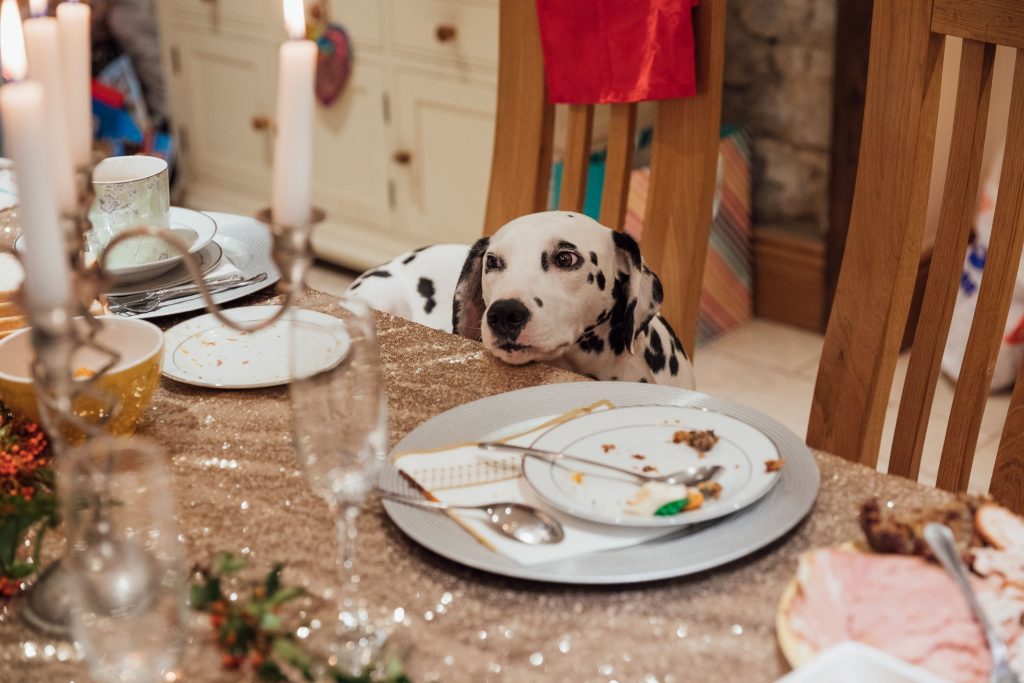Holiday Pet Safety in the Kitchen and Dining Room

The holidays (that is, the weeks between Halloween and New Year’s) center around food, a fact not overlooked by our pets. Most pets notice each new item or special ingredient brought home and plot to get a taste as soon as you’re otherwise occupied. Indeed, the holidays bring out the opportunist in every pet, so it’s up to us to fashion alternative experiences to the rich, fatty or even toxic foods that humans indulge in this time of year. The key to holiday pet safety is careful observation of what’s going in your pet’s mouth.
The Risks to Your Pet
Whether you’re hosting a family holiday dinner or preparing some dishes to share as a guest, your pet will probably be right under your feet. The good news is that you can control what they have access to, and provide substitutions to keep them satisfied (and out of trouble).
Holiday pet safety hinges on asking guests not to feed your pet, and to quickly clean up any fallen morsels so your pet isn’t tempted. Monitoring their actions and behaviors during the holidays is also essential.
Pet Pancreatitis
Primarily responsible for the production and release of important digestive enzymes, the pancreas can become inflamed after a pet eats any of these foods:
- Gravy
- Skin or fat from poultry
- Items made with loads of butter, dairy, or cheese
- Bacon
- Grease
- Sugary foods
Pet pancreatitis is a dangerous condition and must be tended to promptly. Without treatment, the tissues in the GI tract as well as the pancreas itself can be irreparably damaged.
Looking Out
The symptoms of pet pancreatitis include:
- Ongoing vomiting and/or diarrhea
- Hunched posture
- Fever
- Weakness
- Bloated appearance
- Loss of appetite
Acute pancreatitis can affect both cats and dogs. Repeated incidents can lead to chronic pancreatitis and numerous associated health risks.
Part of the Puzzle
There are other factors that can influence whether or not a pet will develop full-blown pancreatitis, such as obesity, diabetes, hypothyroidism, and genetics.
Only supportive care can help a pet suffering pancreatitis. Intravenous fluids, management of any pain, rest, and careful food portions can help a pet get back on their feet. Depending on the severity, a pet may need a long respite period.
There is no cure for pancreatitis. Prevention is the best medicine.
Elevate Holiday Pet Safety
You can still include your pet in the holiday fun. Offer them a healthy plate that features any of the following:
- Bite-size white meat turkey
- Steamed carrots or green beans
- Steamed potato, sweet potato, or yam (remember no butter or milk!)
- A side of unsweetened pureed pumpkin
Give it to them before dinner so they aren’t as hungry while you gather at the table, or feed them at the same time as your family meal.
Exercise can reduce any unwanted behaviors like pacing, jumping on the table, whining, or begging. Be sure to provide them with a quiet space where they can relax.
If you have additional holiday pet safety questions or concerns, call us at (347) 915-1420. Your friends at All Creatures Veterinary Hospital of Brooklyn are always happy to help.

